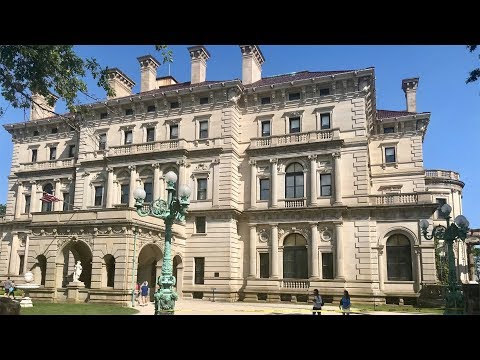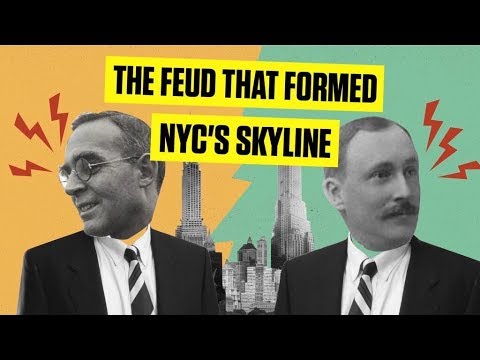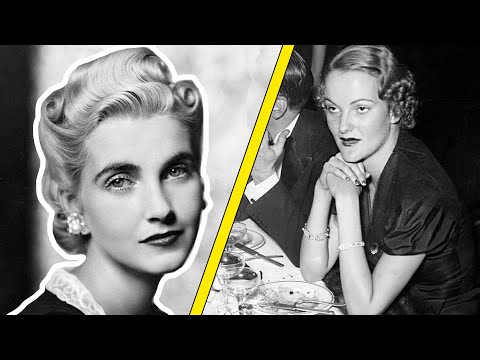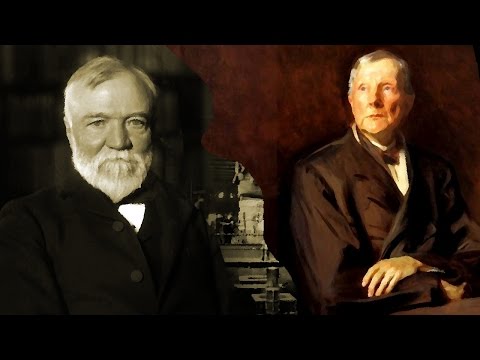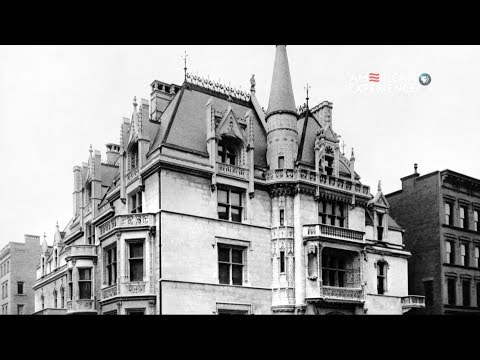However, stories of shockingly decadent and outrageously lavish lifestyles have always drawn a lot of interest. From rivalries to grand gestures to simply showing off, these are 10 times rich people tried to top each other.
10 Alice and Alva Vanderbilt
Many families are competitive, but few have taken their rivalries to the level of sisters-in-law Alice Claypoole Vanderbilt (married to Cornelius Vanderbilt II) and Alva Vanderbilt (married to William Kissam Vanderbilt). During the late 19th century, the two women tried to top each other with the construction of elaborate summer homes in Newport, Rhode Island. These structures, called “cottages,” were more like palaces. Designed by architect Richard Morris Hunt between 1888 and 1892, Alva’s Marble House was completed first. Although much of it was marble, and it was said to be modeled on the Petit Trianon at the Palace of Versailles, it would seem that Alice managed to top her with the same architect. Hunt designed The Breakers, a 70-room, five-story, all marble and steel house, 62,482-square-feet with a view of Easton Bay. Both houses are representative of the Gilded Age, and you can visit them to peek into this familial rivalry.[1]
9 Richard Burton Outbids Aristotle Onassis
Although Richard Burton was an actor from Wales and Aristotle Onassis was an enormously wealthy Greek shipping tycoon, the two men had a surprising amount in common. This included their ostentatiously lavish lifestyles, a taste for celebrated women, and the willingness to spend astronomical sums on jewels for their lady loves. It turned out that Burton was just getting warmed up when he purchased the 33.19-carat Krupp diamond for his wife at the time, film star Elizabeth Taylor. So when a 69.42-carat pear-shaped diamond went on the market, Burton was interested, as was Onassis, who was shopping for wife Jacqueline Kennedy Onassis’s birthday. Onassis decided that her gift had to be at least 40 carats because it was her 40th birthday. When the thrilling auction was held in 1969, Onassis dropped out at $700,000. So it boiled down to Burton’s rep, who was given a limit of $1,000,000, and Robert Kenmore of Kenmore Corporation, which owned Cartier Jewelers. Kenmore won the diamond for $1,050,000. However, Burton quickly bought the stone from Cartier for $1.1 million, naming it the Taylor-Burton Diamond.[2]
8 Gloria Guinness Shows Up Babe Paley
Two of the 20th century’s most famous socialites, Babe Paley and Gloria Guinness, were part of writer Truman Capote’s exclusive clique of wealthy, glamorous female friends known as “swans.” However, sometimes they behaved more like cats toward one another. During their longstanding rivalry, Paley did her best to make sure everyone knew about Guinness’s shady past as a nightclub worker in Mexico. But Guinness was a worthy adversary who embarrassed and upstaged her frenemy when they vacationed together on the Guinness’s yacht. She tricked Paley, telling her to only pack casual clothes. Then, on the very first evening, “Gloria emerged from her luxury cabin dripping in jewels and glittering fabrics, all while insisting the group go to a formal dinner,” according to Factinate.[3]
7 Katy Perry’s Bid for Orlando Bloom
It’s unusual to hear about a wealthy person outspending someone for a good cause, but that’s what happened when pop star Katy Perry paid $50,000 at a charity auction in 2018 for a date with Orlando Bloom. According to People, the event was to raise “money to help Malibu rebuild following the devastating California wildfires.” She outbid a woman who had offered $20,000. At first, Perry was actually on stage trying to help auction off the lunch date with Bloom but then apparently had “second thoughts.” The most ironic part is that Bloom and Perry were already dating at the time, so she didn’t need to buy a date with him. But it was evidently worth it to her to prevent another woman from going out with her man.[4]
6 Battle of the Skyscrapers
In what came to be known as “The Race into the Sky,” architect H. Craig Severance, who was designing a building for banker George Ohrstrom, competed with William Van Alen. Van Alen was designing the headquarters for the Chrysler Corporation to build the tallest building in the world. This wasn’t just a professional rivalry. The two men were former business partners whose association had ended badly. Watch this video on YouTube Severance was so determined to outdo Van Alen that he added an additional two stories to the original plans and eventually added another 20 meters (65 feet), making the 62-floor building the tallest. However, the victory was short-lived as Van Alen had a trick up his sleeve. He added a 38-meter (125-foot) spire to the top of the 246-meter (808-foot) Chrysler Building, thereby winning the competition. Ironically, just one year later, in May 1931, the 381-meter (1,250-foot) tall Empire State Building, designed by Shreve, Lamb & Harmon, beat out the Chrysler Building for the record, remaining the tallest building until the completion of the World Trade Center in 1973.[5]
5 The Tobacco Heiress vs. The Dime Store Heiress
Doris Duke, born into a tobacco empire, and Barbara Hutton, who inherited a fortune generated from Woolworth’s 5 and 10 Cent Stores, were among the world’s wealthiest women. Their extravagant, outrageous lives were closely covered by the media, beginning in the 1930s. The heiresses started out as friends but later became bitter rivals. They frequently competed over men. This included when Duke flirted with Hutton’s ex-husband Cary Grant, which was followed up by Hutton marrying Duke’s ex-husband, Dominican diplomat and playboy Porfirio “Rubi” Rubirosa. One particularly blatant example of Hutton using her wealth to try to steal a man from Duke was when she called Duke’s jazz musician boyfriend, Joe Castro, with an impressive offer, saying: “I’d give you more than she would. If you were with me, you’d have a symphony orchestra,” according to Town & Country.[6]
4 Another Round of Duke vs. Hutton
During a rare time when the famous heiresses were actually getting along, Doris Duke invited Barbara Hutton to her home in Hawaii. However, Hutton, who was used to having her own way, turned out not to be a very gracious guest. She didn’t care for the furnishings, so instead of merely giving Duke the name of her decorator, she used Duke’s absence as an opportunity to remove the furniture, which included priceless Asian artwork, replacing it with modern Japanese décor. When Duke came home, she reacted by throwing Hutton out.[7]
3 Andrew Carnegie and John D. Rockefeller
Steel titan Andrew Carnegie and oil baron John D. Rockefeller had a long rivalry, fueled on Carnegie’s part by a hunger for revenge. Carnegie blamed Rockefeller for the “1873 crash that hurt his biggest customers, the railroads.” He also held Rockefeller responsible for the death of his mentor, Thomas Scott, who died just a few years after the crash. Carnegie’s goal was to amass a bigger fortune than Rockefeller and replace him as the richest man in the world. In his effort to accomplish this, Carnegie went into business with the ruthless former coal baron Henry Clay Frick, who helped grow their steel company by buying out competitors. However, Frick’s irresponsible actions while building an “exclusive men’s club for the rich and famous” led to the horrific 1889 Johnstown Flood that killed 2,209 people. After that, Andrew Carnegie, a member of the club, re-evaluated his priorities. No longer ruled by greed and vengeance, Carnegie launched into the generous philanthropy he is remembered for today.[8]
2 The Nouveau Riche Vanderbilts Break into High Society
Once upon a time in old New York, the iconic Vanderbilts, who made their fortune in the railroads, were looked down on as “new money” and refused entry into high society by the old guard, which was ruled by Mrs. Astor. This was distressing, particularly to the social-climbing Alva Vanderbilt. However, what the family lacked in pedigree, they often made up for in unabashed extravagance. The thing that finally wore down Astor was her daughter’s desperation to be invited to Vanderbilt’s spectacular costume ball held as a housewarming party for Cornelius and Alva’s French chateau-inspired New York townhouse. Watch this video on YouTube The now legendary ball on March 26, 1883, in which guests wore custom-made costumes, dressing as historical and mythical figures, was over-the-top opulent. The ballroom of their Fifth Avenue home was completely transformed into a “fairyland.” There were vases and baskets filled with myriads of roses, and the rooms were decorated in gold and silver. The Vanderbilt spent $65,000 on champagne, catering, and cigars alone. The entire party cost $240,000—an estimated $7 million in today’s dollars. In order to score seats at the hottest ticket in town, Astor swallowed her pride and left her calling card at Vanderbilt’s house, signaling that the Vanderbilt family was movin’ on up.[9]
1 William Randolph Hearst Tops Everyone
The controversial, larger-than-life publishing mogul William Randolph Hearst, best known today as the inspiration for Citizen Kane, topped just about everybody when he built the fantastical and unbelievably lavish Hearst Castle or La Cuesta Encantada (The Enchanted Hill) on his vast San Simeon, CA, ranch. Designed by architect Julia Morgan in the Mediterranean Revival style, La Casa Grande (The Big House) comprises “115 rooms—including 38 bedrooms and 41 bathrooms—and has a cathedral-like facade, complete with two bell towers.” Watch this video on YouTube With an interior décor and architecture that was inspired by European palaces and churches, the mansion features a huge collection of antiques and artworks. The grounds included what was once the largest private zoo. Hearst’s estate is something you would expect to only find in a movie, so it’s fitting that it became the playground of Hollywood A-listers like Charlie Chaplin, Bette Davis, Cary Grant, Gloria Swansen, and Clark Gable, who would attend elaborate parties hosted by Hearst’s mistress, actress Marion Davies. Hearst could be very competitive in his professional life. His fierce rivalry with Joseph Pulitzer is well documented. However, the most compelling part of his legacy may be his home, which makes most other famous showplaces look shabby by comparison.[10]
